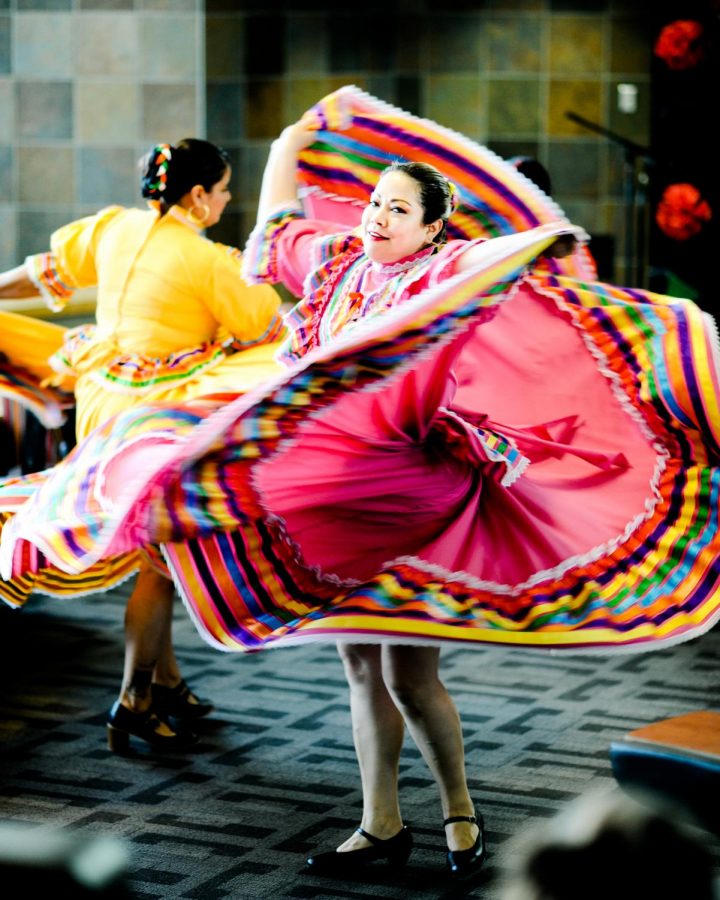CWU celebrates impact of César Chavez
Governor Inslee signs bill to make March 31 César Chavez Day.
In celebration of Cesar Chavez’s birthday, Jalisco dancers performed in the SURC Pit.
April 4, 2018
Jalisco dancers twirled around the SURC Pit, mariachi music permeated throughout the building and the smell of fresh tacos and horchata filled the air.
Mexican culture was alive and on display last week.
On Thursday March 29, the Center for Leadership and Community Engagement (CLCE) honored the life and work of César Chavez as part of week-long series of events focused on farm workers called the Semana del Campesino.
On Saturday March 31, Governor Jay Inslee signed House Bill 1939 in Yakima, officially making March 31 César Chavez day in Washington state.
Chavez, who is remembered for his activism work and mobilization of farm workers, has been honored with his own holiday due to the activism and persistence of citizens in the Pacific Northwest.
“Our students on campus are part of a greater community who are making this happen,” Elizabeth Vidaurri, program manager at the CLCE, said.
A farm worker’s simulation took place all week within SURC 135, also known as the César Chavez room, with the intention of educating students on the hardships and struggles that many immigrants and Latinx students face.
At the simulation, students were given the opportunity to dress like farm workers and pick fruit for a paycheck. Attempting to buy groceries on a razor-thin budget while facing language barriers was also included to add as much realism as possible.
Rocks were added to the fruit baskets to simulate weight and students stooped and hunched over in order scrape strawberries off the SURC floor.
Vidaurri says the CLCE wanted to start something more experiential for students and plans to expand on the simulation next year. “If you’ve never been through it, you can’t relate to it 100 percent,” Vidaurri said.
Jessica Ortega-Mendez, member of the Chavez-King Leadership Institute for Social Change, says it’s important for Wildcats to learn about civil rights issues, including those not popularly covered in textbooks.
Ortega-Mendez, who has picked strawberries in the fields with her father, knows firsthand how hard and physically demanding life can be for those who find themselves picking fruit for a living.
“A lot of people don’t really understand how tough it is, and we’re getting underpaid for it as well,” Ortega-Mendez said. “A lot of families don’t have immigration status, they’re not legal, they end [up] having to work in these fields.”
Ortega-Mendez says her parents specifically wanted her to work in the fields to instill a sense of gratitude within their child, which is something she carries with her to this day.
The work experience in her formative years motivates her academics at CWU.
“We have this privilege of getting an education so we might as well take it,” Ortega-Mendez said.
Jessica Hernandez of Movimiento Estudiantil Chicano de Aztlan, a sophomore at CWU, has worked in the fields and warehouses in Washington state. Hernandez wants to bring awareness to exploitation and injustice in the workplace.
“A lot of current issues are happening. There’s a lot of companies still exploiting their workers and underpaying their workers,” Hernandez said. “It’s still an issue that is happening.”
Hernandez believes that exploitation still exists in the workplace for Latinx because of Americans turning a blind eye to controversial subjects like systemic racism.
Many Mexicans and Mexican Americans end up making manual labor jobs careers due to a lack of education and upward mobility.
Hernandez says many of the elderly women in the warehouse she worked would tell her to “Keep going with your education because you don’t want to end up here like I did.”
The Chavez-King Leadership Institute is currently accepting applications from students on campus and offers a $1000 tuition fee waiver to any students accepted into the program.


